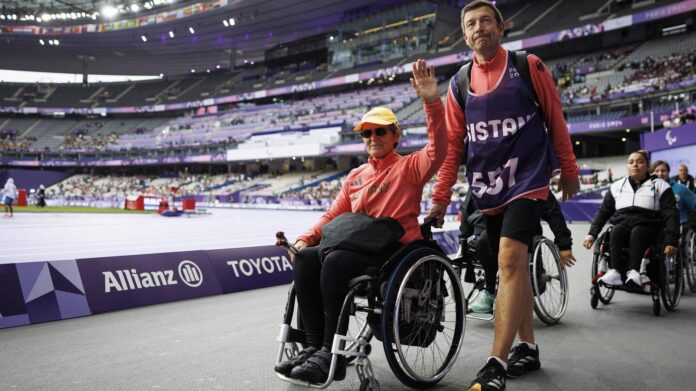Martina Willing has been taking part in the Paralympics for 32 years – half her life. The first Paralympics in which the now 64-year-old took part were the Games in Barcelona in 1992.
Since then, she has taken part in every Summer Games – and even in the Winter Paralympics in Lillehammer in 1994. The athlete’s successes include three Paralympic medals and five world championship titles. The 64-year-old, who is visually impaired and paraplegic, came sixth in the javelin throw in Paris.
The Games in Paris are your tenth Paralympics. What was this experience like for you and how did you feel about it?
It’s great to be here, especially after Tokyo. The 2021 Paralympics were dominated by Corona and not what we all had hoped for. There were no spectators, so we had to create a good atmosphere ourselves. Compared to that, this is of course an absolute blast. I’m really happy that I was nominated and can do it again. Ten Paralympics, that’s quite a number.
You came sixth in Paris. How was the competition for you?
Of course I can’t compete at the top anymore. But they had to get five women to beat me! My goal was to come eighth and reach the final. Now I even came sixth. But I was one meter short of my actual distance. I had to compete with a different backrest than I was used to. The one I normally train with wasn’t accepted during the equipment check. That was obviously unusual for me and I had to improvise a little. I think I lost my meter there. But when I consider that the majority of the participants are more than 30, 35 years younger than me, I am absolutely satisfied.
Your first Paralympics were in Barcelona in 1992. Do you still remember it well?
Very precise, in fact. When you have the whole stadium to yourself as an athlete and you throw over the world record during the throw-in, you don’t forget it. In this competition, I then improved the world record three times. I remember it as if it were yesterday. The atmosphere in Barcelona was great. These are things you don’t forget. The Spanish were also a little more temperamental than the French. People stopped you everywhere and asked for photos and autographs. That’s not quite the case here in Paris. All the games I took part in were beautiful in their own way. Although I would exclude Tokyo due to the corona situation.
Do you have a favorite among the ten games?
The second worst after Tokyo were the games in Atlanta in 1996. We arrived there and had the feeling that the organizers had forgotten us. They were already busy dismantling everything! I can’t choose a favorite, I don’t know. But Barcelona, Beijing, London, Paris are all on the same level, because I remember them all equally fondly.
The 2012 Paralympics in London were a kind of breakthrough for the sporting event. Disabled sports suddenly received much more attention. Can you remember any changes that you noticed as an athlete?
In London there was a large Olympic Park where, in addition to the competitions and training sessions, you could spend a lot of time with the British on site. This was something you hardly had before. This face-to-face time had its own flair.
Are you still nervous after your tenth game?
You still get the tingling feeling. It’s not that adrenaline anymore, but you’re still very excited beforehand. It certainly makes a difference whether you know you can fight for medals or whether you say to yourself: “I want to go out here as an old bag and show the young ones that it’s still possible.” Now I’m more there to give the younger colleagues a bit of peace. I’m the mother of the company here. My competition is over now, so from now on I’m there for the others.
Ten Paralympics, that’s quite a number.
Martina Willing
These were your last Paralympics. What’s next for you?
Now I’m looking into whether I can go to the World Championships next year. I’d still like to do that. But first I need to change something about my chair. I already have an idea, but I need someone to implement it. Something like yesterday must not happen again.
You have followed the development of the Paralympics closely over the years. In your opinion, are there areas where there is still a lot of potential for development?
There is still a lot of room for improvement, especially in the big competitions. I am always asked to what extent doping plays a role in our sport – but for us the technical expansion is relevant. I would like to see a bit of tinkering with the rules. It should be like canoeing: everyone designs their own boat so that they can get the best out of their own body. It should be the same in the throwing disciplines.
